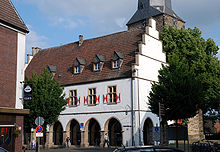Schwerte
Schwerte | |
|---|---|
 Church of St. Victor | |
Location of Schwerte within Unna district  | |
| Coordinates: 51°26′45″N 7°33′55″E / 51.44583°N 7.56528°E | |
| Country | Germany |
| State | North Rhine-Westphalia |
| Admin. region | Arnsberg |
| District | Unna |
| Government | |
| • Mayor (2018–23) | Dimitrios Axourgos[1] (SPD) |
| Area | |
• Total | 56.2 km2 (21.7 sq mi) |
| Elevation | 120 m (390 ft) |
| Population (2023-12-31)[2] | |
• Total | 46,571 |
| • Density | 830/km2 (2,100/sq mi) |
| Time zone | UTC+01:00 (CET) |
| • Summer (DST) | UTC+02:00 (CEST) |
| Postal codes | 58239 |
| Dialling codes | 02304 |
| Vehicle registration | UN |
| Website | www.schwerte.de |
Schwerte (German pronunciation: [ʃveːɐ̯tə] ; Westphalian: Schweierte) is a town in the district of Unna, in North Rhine-Westphalia, Germany.
Geography
Schwerte is situated in the Ruhr valley, at the south-east border of the Ruhr Area. South of Schwerte begins the mountainous Sauerland region.
Division of the town
After the local government reforms of 1975 Schwerte consists of the following districts:
History
Schwerte received civic rights in the 12th century.
The railway facility in the eastern district of Schwerte became a branch of the Buchenwald concentration camp in April 1944. The camp had 445 prisoners in August and 670 in November 1944. The number of escapees was comparatively high; in November 1944 48 prisoners escaped. The camp in Schwerte was disbanded in December 1944 and the remaining prisoners were brought back to Buchenwald.[3]
Main sights
- The Romanesque church of St. Victor has a carved altar of 1523, and stained glass of the 14th and 15th centuries.
- The Wuckenhof is a timber-framed house built in the 16th century.[4]
- The Ruhrtalmuseum is situated in a former town hall, that was built in 1547.[5]
- The Rohrmeisterei was built in 1889 by a water purification company. It was a pumping station until 1924. Today it is part of the German route of industrial heritage (Route der Industriekultur).[6]

Economy
Today, there are some industries left, which are confined to the manufacture of iron and steel goods.
Twin towns – sister cities
 Béthune, France (1960)
Béthune, France (1960) Bruay-la-Buissière, France (1965)
Bruay-la-Buissière, France (1965) Violaines, France (1969)
Violaines, France (1969) Allouagne, France (1975)
Allouagne, France (1975) Hastings, England, UK (1982)
Hastings, England, UK (1982) Cava de' Tirreni, Italy (1984)
Cava de' Tirreni, Italy (1984) Leppävirta, Finland (1992)
Leppävirta, Finland (1992) Pyatigorsk, Russia (1992)
Pyatigorsk, Russia (1992) Ioannina, Greece (2022)
Ioannina, Greece (2022)
Notable people
- Johannes Goddaeus (1555–1632), jurist
- Heinrich Rehkemper (1894–1949), baritone singer
- Erwin Rösener (1902–1946), SS-Obergruppenführer Nazi officer executed for war crimes
- Werner van der Zyl (1902–1984), rabbi
- Detlef Lewe (1939–2008), sprint canoer, lived in Schwerte
- Paul Kevenhörster (born 1941), political scientist
- Wolfgang Kleff (born 1946), footballer
- Rosemarie Trockel (born 1952), artist
- Carmen Rischer (born 1956), rhythmic gymnast
- Thomas Kroth (born 1959), footballer, lives in Schwerte
- Violetta Oblinger-Peters (born 1977), Austrian slalom canoeist
- Jens Ewald (born 1983), slalom canoeist
- Lasse Sobiech (born 1991), footballer
References
- ^ Wahl des/der Bürgermeisters/in Stadt Schwerte 04.03.2018, accessed 30 June 2021.
- ^ "Bevölkerung der Gemeinden Nordrhein-Westfalens am 31. Dezember 2023 – Fortschreibung des Bevölkerungsstandes auf Basis des Zensus vom 9. Mai 2011" (in German). Landesbetrieb Information und Technik NRW. Retrieved 2024-06-20.
- ^ Benz, Wolfgang; Barabara Distel; Angelika Königseder (2006). Der Ort des Terrors: Geschichte der nationalsozialistischen Konzentrationslager (in German). C.H.Beck. pp. 572–574. ISBN 978-3-406-52963-4. Retrieved 2009-03-29.
- ^ Teil VI: Die Freiherren von Syberg zu Schwerte, Hees und Sümmern (German)
- ^ Das Ruhrtalmuseum (German)
- ^ Rohrmeisterei Schwerte (German)
- ^ "Die Schwerter Arbeitskreise". staedtepartnerschaft.schwerte.de (in German). Schwerte. Retrieved 2021-03-24.
External links
- Official website (in German)
- Heimatverein Ergste Internet site of the local history society of Ergste



